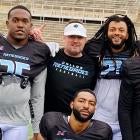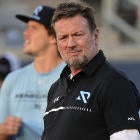It was a dreary and still somehow kind of a muggy day for a January in Houston, but Bob Stoops was radiant sunshine. XFL training camp was underway and the Dallas Renegades coach was making his way down to the field for practice when he was asked to stop to answer some questions. What popped in the few minutes he was able to give was how glad he was to be back on the sidelines again after a three-year absence from the game.
"You know, I just love football," he told CBS Sports. "Being on the field, coaching football, watching football, watching some good players play their football. They really love the game as well. So it's been great."
A concise, if not general, answer, but also telling if you consider the context. The XFL is the place to go for longtime college coaches, in the twilight of their career, looking for another spark.
Let's step back a moment. Stoops was -- and still is -- one of the best coaches in college football history. He's the winningest coach at Oklahoma, one of the sport's true blue blood programs, with a national championship to boot. But in the summer of 2017, at age 56 and after 18 seasons as the coach of the Sooners, Stoops decided he had enough. It was a shocking move, especially given the timing, but it made complete sense knowing his backstory.
Stoops' father, Ron Sr., died at age 54 on the way to the hospital after having a heart attack while coaching Cardinal Mooney High School in Youngstown. That moment stuck with Stoops, but even beyond that, the people who knew him best always said he was adamant that he would not be coaching well into his 60s. It was not something he wanted to do forever.
And, so, Stoops took some time off. He stuck around Norman, Oklahoma, for a bit with his family and caught up on all the things he was unable to do when he was coaching full time. He continued to talk often with his mentor, Steve Spurrier, who went through his own retirement spell at South Carolina in 2015 before returning to football by way of the Orlando Apollos with the short-lived AAF. Spurrier called his own return to football a byproduct of the "three-year itch," something Stoops can relate to.
"[You realize] just how much you miss the camaraderie of being around your gang of players and your crew coaches," Stoops said. "You're with all these guys all of the time. You get used to it and then all of a sudden you're removed from it. It's not easy to, it's a big adjustment.
"I was ready for that, but it was still hard."
So, here is Stoops, age 59, and back in the game. This is different, though. The new XFL is pushing the mantra of being an actual football league led by Capital-F Football Guys. And Stoops is certainly one of them. Unlike college football, though, there are no boosters to glad-hand in the XFL. There are no recruits to hard sell and no excess nonsense. Stoops can coach some ball for a few months in the spring, be done by summer and go see his son, Drake, at Oklahoma in the fall. It's the good life with just the right amount of football.
Stoops' tale is hardly unique. June Jones, who coaches the Houston Roughnecks, knows exactly how important that balance is. Jones was an accomplished program-builder at Hawaii and SMU, taking two run-down teams and turning them into contenders. Jones enjoyed particular success at Hawaii with a pair of top-10 all-time FBS passers, Timmy Chang and Colt Brennan. However, by Jones' final two years at SMU he looked tired and disinterested. He had been coaching for 30 years.
"Well, I had a similar situation to [Stoops]," Jones said. "I stepped away at SMU because I was burnt out and was having some mental things, forgetting stuff. And it just comes from that pressure of not sleeping and all that kind of stuff. So, I had to take a step away. So, I went back, coached high school for a couple of years and then took the head job in Hamilton at CFL and got back in it."
Stoops and Jones took a breath before diving back into football, a move that's becoming far more of a trend these days among big-time college coaches. Across college football, more and more coaches seem to be aware of their own career mortality and its side effects. Ohio State coach Urban Meyer stepped away in December of 2018 at age 54 due to health concerns. This past December, Washington coach Chris Petersen announced his own sudden resignation at age 55. Petersen left the door open to a return to coaching, but like so many other similar instances, he lamented the stresses of coaching college ball at the Power Five level.
Coaching in the XFL has been reinvigorating. Stoops likened it to coaching a team of fifth-year seniors. Jones thought it was more like professional football. However, they view it, though, they agree it's a chance to start over. Head coaches will hold general manager titles on top of their usual coaching duties, but for ex-college coaches, the job is far more compartmentalized. And college football fingerprints are all over the coaching staffs in this league. Hal Mumme, the Godfather of the Air Raid offense, is working for Stoops as the offensive coordinator. Norm Chow, a long-time play-caller who was last seen struggling at Hawaii, is drawing up schemes for the L.A. Wildcats; and Mike Riley is the OC for the Seattle Dragons.
"I love what we do. I love throwing the football around. I love teaching the guys something new," Jones said. "I really enjoy seeing these guys go to a different level. To see [wide receivers] Cam Phillips and Kahlil Lewis, they're going to really excel in what we do because of the gifts they have. And we really do a good job of allowing those gifts to show within our offense."
That'll be a key point. The XFL has tweaked its rules to benefit the offense. Quarterback play will matter, which means coaching will matter. There is no shortage of legendary coaches in the XFL, so the question will be whether they will be able to maximize the capabilities of guys stuck in pro football purgatory. Commissioner Oliver Luck has said in all the coaches he identified as candidates for the league, it was easier to go with more experienced coaches than newer ones. At some point, though, if the XFL is to survive longterm, it'll need younger coaches to step in. It'll be another route for them to climb up the ladder while making the league more appealing.
For now, though, the XFL has become a landing spot for former college and pro coaches who want the fulfillment of staying in the game without the stresses of having to run every little part of the team.
"In every place I've been, it doesn't matter if it was the Oilers when I was there, the Falcons, the Chargers ... they were the worst team in the league," Jones said. "SMU was the worst team. Hawaii was the worst team. And so, you had to build up to go. Now, [director of player personnel] Randy Mueller done a great job gathering the talent for this. So, this is the first job I ever had where we're equal to everybody from the get go. So, I'm jacked up about it."
















